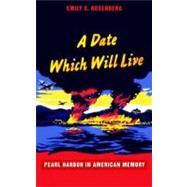- ISBN: 9780822332060 | 082233206X
- Cover: Hardcover
- Copyright: 10/1/2003
December 7, 1941-the date of Japan's surprise attack on the U.S. fleet at Pearl Harbor-is "a date which will live" in American history and memory, but the stories that "will live" and the meanings assigned to them are hardly settled or singular. In movies, books, and magazines, at memorial sites, in ceremonies, and on television and the internet, Pearl Harbor lives in a thousand guises and symbolizes dozens of historical lessons. A Date Which Will Live examines Pearl Harbor in American history and memory. Historian Emily S. Rosenberg does not try to determine the truth of this iconic event, but rather to explore the variety of cultural meanings-and political contests-that have been attached to the words "Pearl Harbor."Rosenberg considers the emergence of Pearl Harbor symbolism from multiple perspectives: as the day of infamy that upended ideas of U.S. military preparedness, the attack that opened a "back-door" for U.S. involvement in World War II, a commemorated event, and a rupture in American-Japanese relations. She explores the numerous, overlapping cultural contexts that have contributed to Pearl Harbor's resurgence in American memory since the fiftieth-year anniversary in 1991. Among these she identifies a "memory boom" in American culture, the movement to exonerate commanders Admiral Husband Kimmel and General Walter Short, and the political mobilization of various groups during the culture and history "wars" of the 1990s, as well as the effect of the blockbuster movie Titanic in propelling historical spectacles such as the film Pearl Harbor to theater screens. Rosenberg also discusses the use of Pearl Harbor as a historical frame for understanding the events of September 11, 2001.






